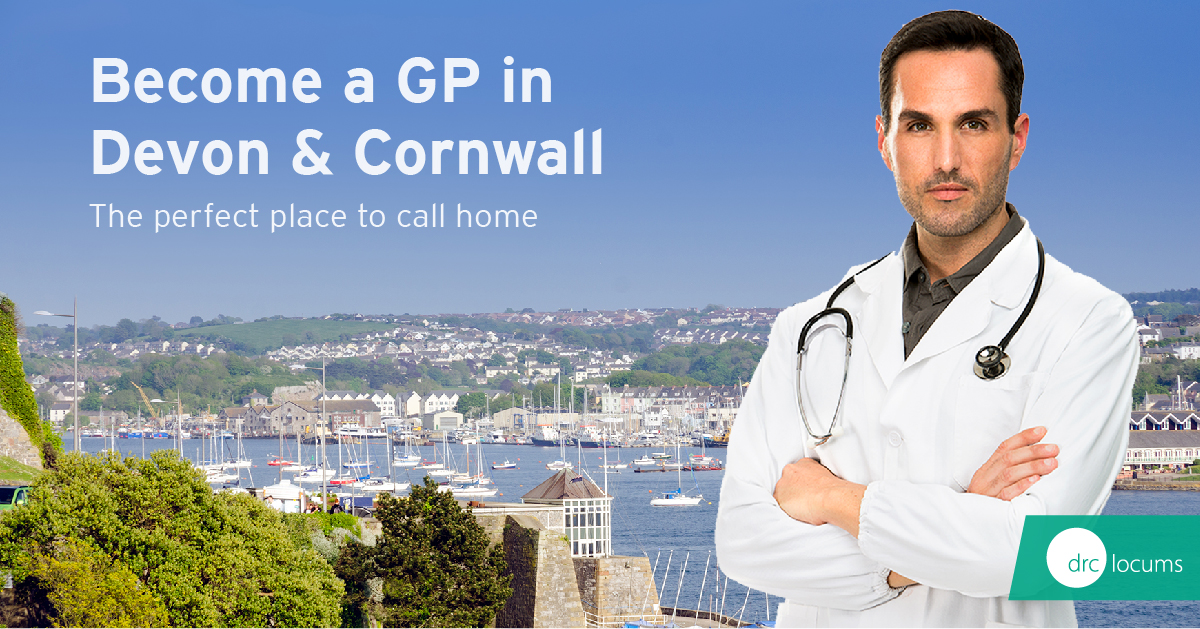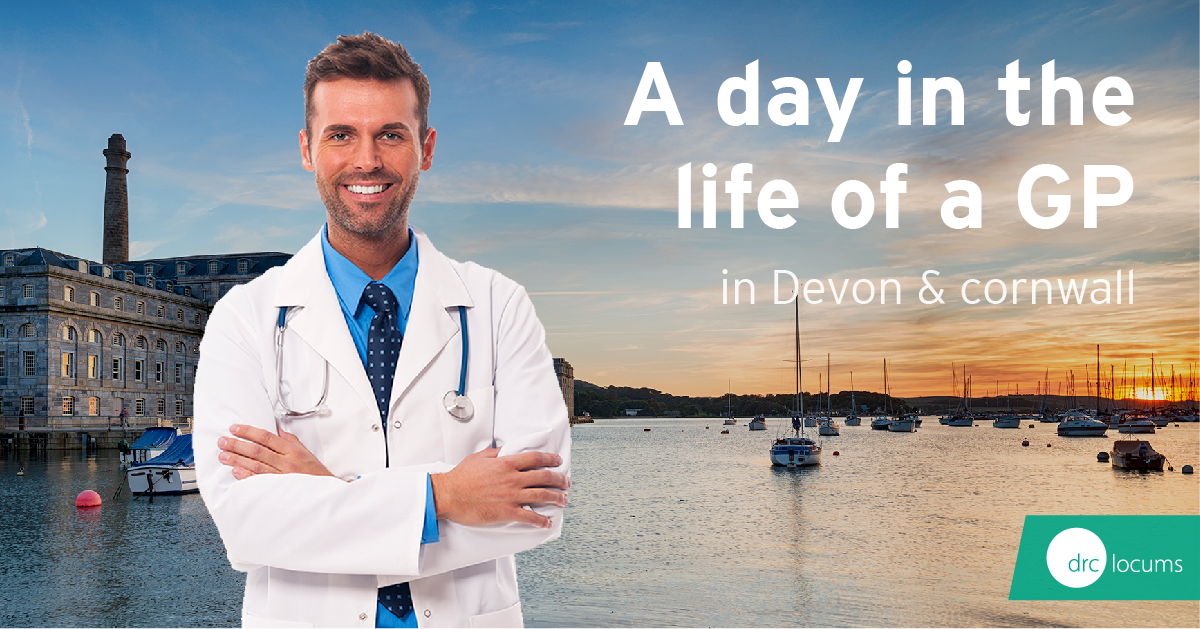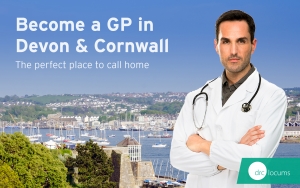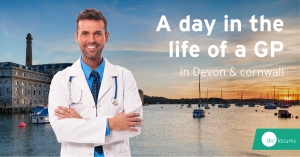Become a GP in Devon and Cornwall: The perfect place to call home

You may have read our blogs in which we outline the training available and the earning potential of becoming a family doctor in England; but what is it like to actually live in a place like Devon and Cornwall?
The South West of England is arguably one of the best places to live in the UK: in fact, Devon was recently voted as England's best county to live in by Country Life Magazine, taking into account everything from crime figures to food to green space, council performance and composting.
Often, assessing your work-life balance can be the catalyst for a change in location and in priorities: it's all too easy to get caught up in the daily monotony of the city, dashing to work, working inflexible hours, getting caught in traffic. The two counties of Devon and Cornwall are renowned for their relaxed, friendly way of life, and whether you see yourself living in a vibrant city full of museums and restaurants, exploring beautiful woodland and countryside or making the most of the seaside, there is sure to be something to suit you.
While the people here work just as hard as in other areas of the country, the workplace atmosphere is can be much more flexible and friendly, and the approach to life is laidback and relaxed: it's a world away from gruelling commutes and overcrowded streets.
While the UK may be famous for its rain, coastal areas in the South West have more than their fair share of sunshine, receiving an average of 1600 hours of sunshine each year. With warm summers and mostly gentle winters, it's a fantastic place to live for those who love to get outside, whether it's hiking on wild moors or spending time on the numerous stunning beaches, surfing, sailing or simply poking around in rock pools.
Devon is the larger of the two counties, still within easy reach of London, but with over a third of the county designated as Areas of Outstanding Natural Beauty and 450 miles of stunning coastline. Don't worry that life here is too quiet: Devon has two busy cities in Exeter and Plymouth, plus numerous costal and market towns, and a lively food and arts scene. One the largest cities on the south coast, Plymouth has a rich maritime heritage, a stunning waterfront and a vibrant cultural life, while Exeter is a Roman-walled city of squares and cobbled streets, renowned for its high quality of life and flourishing arts scene.
For times when you want to get outside and explore, Devon never disappoints. Its famous Dartmoor National Park has a rugged beauty all of its own, famous for its granite tors, stone circles and ancient villages, while Exmoor National Park offers woods and streams, large areas of moorland, and spectacular coastal views.
Cornwall has a smaller population and is well known for its beaches in particular. It boasts the Eden Project, with its distinctive domes housing rainforest and Mediterranean plants; or walk across the causeway from Marazion to the stunning island of St Michael's Mount with its cobbled streets, sub-tropical gardens and stunning castle.
Bodmin Moor is a wild and beautiful Area of Outstanding Natural Beauty for when you tire of the beautiful and varied beaches; but don't think that life in Cornwall is completely provincial – its attractions include Tate St Ives, an offshoot of the main London gallery, and the Minack Theatre on the clifftop above Porthcurno Bay.
Of course, if you love surfing or water sports then Devon and Cornwall are idyllic: the north coast of both counties has some of the best surfing in the world, and sailing, water polo and other water sports are popular activities. Together, the two counties are home to some of the most stunning beaches in the country.
There are plenty of attractions for sports fans on dry land too. Both Plymouth and Exeter have football league clubs, while Truro City is the top-level football team in Cornwall. Exeter is the home of the Chiefs, who won England's rugby Premiership in 2017, and the Cornish Pirates rugby club is based in Penzance. Devon is also home to two racecourses, Exeter and Newton Abbot, while both counties have vibrant sporting scenes that span athletics, cycling, cricket and golf.
Finally, the area is heaven for gastronomes. There is a huge variety of restaurants, including some run by celebrity chefs attracted to the area by the quality of the local produce. The renowned pasty is a popular meal while the cream tea – scones, jam and clotted cream – is served at many cafes and restaurants. Cider is the traditional drink, with a large number of local producers.
Whatever your interests and wherever you see yourself and your family living, you are bound to find it in the laidback charms of Devon and Cornwall. Get in touch now to find out how you can make the move to a more relaxed pace of life.
Why come to work as a GP in Devon and Cornwall?

Moving to the UK to work as a family doctor (known in the UK as a general practitioner, or GP) provides huge opportunities for both your working and your personal life. A variety of areas are currently recruiting GPs, so whether you can see your family living in a vibrant city full of museums and activities; exploring the country's beautiful woodland and countryside in a rural practice; or enjoying all the pleasures of the seaside in a coastal area, there is sure to be something to suit you.
Only four hours from the heart of London, the Devon and Cornwall area is a picturesque and friendly place to start your new life as a GP. As you step out of your new home, you may be faced by idyllic rolling countryside or a striking sea view: why not enjoy a bracing, mind-clearing walk along the beach before heading to the surgery to start your working day?
On a typical day, 30 to 40 appointments are offered to your patients, with the occasional walk-in emergencies. That means at least 30 ten minute sessions: ten minutes to welcome, introduce, glean, triage, diagnose, reassure, comfort, investigate, refer, treat, prescribe and follow up. The work is challenging but exhilarating.
No two appointments are the same and you never know what will be coming up for the next appointment, giving you a fantastic opportunity to expand your clinical practice. Is it a quick case of tonsillitis in someone who's not too poorly?
Working as a GP in the UK, you are the first port of call for the vast majority of patients, giving you the genuine opportunity to make a real difference in people's lives.
Then there are the phone calls. An average day probably involves ten or so calls to patients. In areas where there is a high elderly population, home visits may be required daily and can range from two to eight visits.
Most GPs agree that the best thing by far about the job is the patients. The privilege you feel to have them trust in you and respect your decision-making is immense, and hugely rewarding; being able to fix their problems and make them feel better, control their pain and provide some comfort is extremely gratifying.
The people make this job.
There are several qualities you need to have in your doctor's bag to succeed as a GP in the UK. Professionalism is of the utmost importance, as is the ability to keep your cool under pressure. Resilience is vital: no matter what happened in your last appointment, it cannot affect those still to come. Empathy is also essential to bolster you through the busyness of general practice in the UK.
As a doctor in Devon and Cornwall you will also be able to live in a beautiful part of the country, as part of a friendly community with lots going on. Devon has two busy cities: Plymouth, with its stunning waterfront, marine industry and vibrant cultural life; and Exeter, a Roman-walled city of cobbled streets and squares with a magnificent cathedral and plenty of art galleries, restaurants and shops; while Cornwall is more rural and secluded, and is well known for its beaches in particular, which prove attractive to both families and the surfers.
Downtime in both Devon and Cornwall is a joy. Both counties have a lovely climate, with warm summers and generally mild winters, making it ideal for people and families who enjoy getting outdoors. Devon has two National Parks and over a third of the county is designated as Areas of Outstanding Natural Beauty, with 450 miles of stunning coastline and clean, attractive, family-friendly beaches. Cornwall has Bodmin Moor, an area of outstanding natural beauty, high and wild, and, of course, beaches galore. It's a fantastic place to live for those who enjoy being on the water, whether you surf, sail or simply enjoy walks along the beach and poking around in rock pools.
For those who prefer less pedestrian entertainment, both Devon and Cornwall offer a huge variety of theatres, musical events and restaurants. Seafood restaurants and traditional fish and chips are particularly popular in the many coastal towns and fishing ports, and there are many 'gastropubs' and restaurants run by top chefs attracted by the quality of local produce, including Rick Stein, Nathan Outlaw and Michael Caines.
With attractive housing, free state education for children from 5-18 and beautiful surroundings, not to mention the chance to expand and build upon your clinical practice, working as a GP in Devon and Cornwall offers a unique opportunity. Contact us for more information to start your new life in the UK!
For more information follow click here










